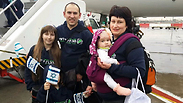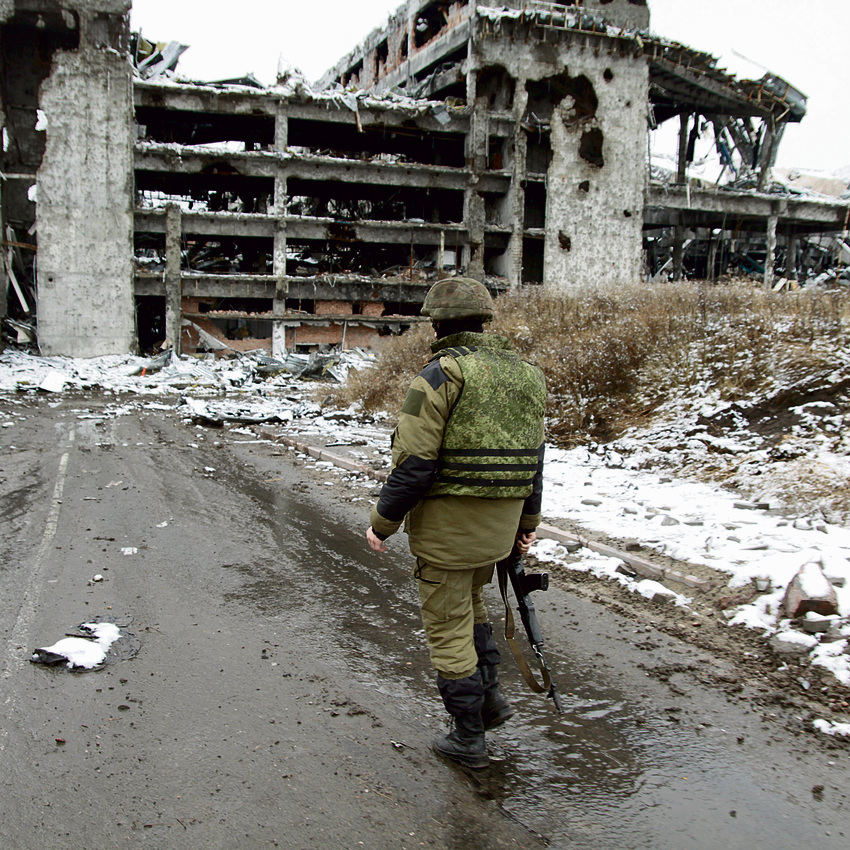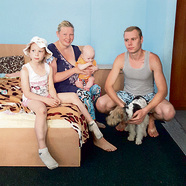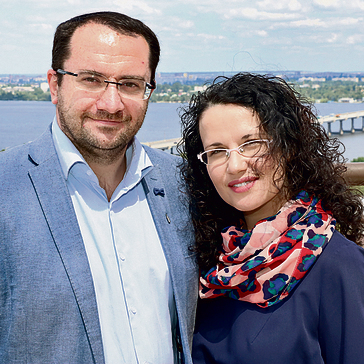
Fears and hopes in Jewish Agency ‘refugee center’ in Ukraine
Six-year-old Angelica was nearly killed from shrapnel in her bed; Victoria and her mother Sofia were trapped in their apartment building after it was hit by five shells; and 18-year-old Nikita convinced his parents to come to Israel with him after a rocket killed an entire family they knew. Jewish families from Ukraine’s conflict zones share their stories as they wait to make aliyah at a ‘transit camp’ near Dnepropetrovsk.
That day in early February 2017, in their rented apartment in the eastern Ukrainian city of Donetsk, the Rozhnovs resolved to immigrate to Israel.
Three years after the beginning of the civil war in Ukraine, many Jews still live in the Donetsk and Luhansk areas, which are controlled by the pro-Russian separatists. When the battles began, Victoria and Stanislav Rozhnov fled Donetsk with little Angelica, who was three years old at the time, and rented an apartment in another, quieter city.
Victoria, 27, is a housewife. Stanislav, 29, a coal miner, went to work at the mine every day, until it was shut down and he ran out of money to pay rent. Left with no other choice, and despite their fears, they were forced to return to their apartment in Donetsk. Baby Maxim was born 14 months ago, and they found themselves in the midst of war with two small children.

"We were so afraid,” Victoria says, “It was a real nightmare. People walk around with rifles and you don’t know what they’re thinking and what they want from you. Sometimes they’re drunk and they just shoot. Some of our acquaintances were killed in bombardments.”
Now they’re about to join Victoria’s parents, who immigrated from Donetsk to Haifa in 2016 and have since been pressuring them to make aliyah too. “We are leaving all our belongings behind and coming to Israel with only three bags. We’ll come to Israel, study Hebrew in an ulpan and start a new life,” Victoria says.
They are bringing along their dog, Betty. The Jewish Agency is helping new immigrants bring their dogs for free and is even funding the air transportation of two dogs to Israel.
When Victoria talks about Israel, her blue eyes light up with a glimmer of hope. It’s hard to say the same about her husband. His eyes look dimmed, and he seems sad. “I’m afraid I won’t have a job in Israel, because you have no coal mines there. But I’m sure things will be better for the children,” Stanislav says.
A Soviet sanatorium
Both Victoria and Stanislav have Jewish grandparents, but they know nothing about the Holocaust. They have never lit a Shabbat candle or fasted on Yom Kippur. The fact they are eligible to make aliyah under the Law of Return is a lifesaver.
I meet them at the “refugee center” created by the Jewish Agency on the banks of the Dnieper River, a 30-minute drive from the city of Dnepropetrovsk and about 220 kilometers from the conflict zones. It’s an old resort village, like a Soviet sanatorium, which serves as a transit camp for Jews who escaped the battles and would like to immigrate to Israel. It’s noting luxurious, but the conditions aren’t bad: Three meals a day, a television in every apartment and an air conditioner. They can bathe in the Dnieper. Most importantly, it’s quiet and safe.

The center was established by the Jewish Agency’s emissaries in Dnepropetrovsk and Kharkiv, Max Luria and his wife Natalie Navitovsky, who are responsible for eastern Ukraine, an area with some 100,000 Jews. They came here from Israel in April 2014 with three children, one of whom was six-months-old at the time. They thought they would have a pleasant and serene mission, but the war broke out two weeks later. The Jewish Agency gave Max an emergency appointment and put him in charge of the evacuation of Donetsk’s Jews.
“Although we are here with babies, we decided to stay and take care of the Jews,” Max says. “The Agency’s security officer instructed us to have an extra fuel tank available, so if something happens, we can put the family in the car and drive towards Kiev.”
When Max and Natalie took in the first Jewish refugees, they immediately noticed their distress. “We saw frightened people who had fled a war zone,” Max says. “They had no passports, and they were afraid to return home.”
He turned to several donors, who helped set up a residential center allowing Jews to recover for a few weeks before their passports are issued and they can undergo an immigration process. More than 630 people stayed at the center in 2016, and at a certain point it accommodated 150 people at the same time. At the moment, there are six families there waiting to make aliyah.
At the center, I meet 50-year-old Victoria Vinnitskaya and her 77-year-old mother, Sofia. They both lived until recently in an apartment building in Donetsk, which was hit with artillery shells.
It happened in the evening hours of April 8. Victoria—a history teacher, psychologist and tour guide—was at home. Her mother, a doctor working at the local hospital, who keeps working as an infectious disease specialist despite her age, was in the adjacent apartment. Suddenly, there was heavy shelling. The building and the yard were hit by five shells. All the windows were shattered. The main gas pipe was ruptured and gas began leaking. The front door was damaged, the elevator got stuck and the tenants were trapped in the building. A structure in the yard, which had served as a cobbler’s workshop, was completely burned.
“We sat in the building like in a death trap until 2am,” Victoria says. “There was the smell of gas in the air and we were afraid everything would explode.” Victoria can’t stop the tears. Sofia is stronger. She doesn’t cry.
Victoria’s 22-year-old son, Alexander, was in Israel at the time as part of the Masa program (semester- or year-long programs in Israel). Friends of his from Donetsk sent him pictures of the damage to his mother and grandmother’s house. All phone and internet service was disconnected, and he didn’t know what had happened to them for more than 24 hours. Contact only returned the next day. “He wouldn’t stop crying on the phone,” Victoria says. “He told me, ‘That’s it, Mother, you must immigrate to Israel. I won’t let you stay there anymore.'"
The two women realized there were no more excuses. They left everything behind and moved to the refugee center ahead of making aliyah. “We could have sold the apartment for $1,500, but we decided it was better not to sell and left the keys with friends.”
Alexander is about to join the IDF. They will live in the northern town of Kiryat Yam, next to friends who immigrated two years ago.
I ask them who they identify with more—the rebels or the Ukrainians. Sofia replies in Yiddish, “I only identify with Israel. We know Israel defends its citizens.”
The Gusev family—38-year-old Natasha, 39-year-old Slava and 18-year-old Nikita—arrived at the refugee center from Donetsk in March and will soon immigrate to Israel. Nikita was supposed to make aliyah as part of the Selah program (an abbreviation for “Students before Parents”), but convinced his parents to join him. His 10 classmates at Chabad’s Or Avner School in Donetsk have all immigrated to Israel already.
“In the first year of the war, things were very difficult,” Nikita says. “We were experienced shelling three times right next to our house. Then we got used to it. We would go down to the basement. There are no air raid sirens here. If you hear a whistle, it’s far away. If you hear something like a strong wind, you should flee, because a few seconds later there’s a large explosion. And several minutes after that, police, army and ambulances arrive. Good friends of ours—a mother, a father and two children—were killed. The rocket came in through the window and killed them.”
The rescue from the hospital
More than 2,000 Jews have immigrated to Israel from the conflict zones since the beginning of the war. The Jewish Agency believes there are still 5,000 or 6,000 Jews left there.
“People are very afraid to leave despite the difficult situation,” Max Luria says. “Because of the war, they can’t sell their houses and property, and they leave with nothing. In Israel, they have to start all over again. Learn a language, find work.”
Luria himself immigrated to Israel in 2006 from Dnipropetrovsk, and his wife Natalie immigrated from the Russian city of Vladivostok. “Their story is my story too, and I give them a lot of inspiration,” says Max.

One of the exciting rescue operations Max and Natalie were responsible for involved two brothers from Luhansk, who had lost their parents at a young age. The eldest one, 23, immigrated to Israel in 2014 and joined the Border Police. His younger brother, 22, is mentally ill and was kept in an isolation ward at a psychiatric hospital all alone, without any relatives. The older brother wanted to bring his sick brother to Israel, but the authorities in Luhansk would only discharge him from the hospital if his brother arrived and took responsibility for him. He planned to do so, but Jewish Agency officials were afraid if he travelled to Ukraine to pick up his brother, the Luhansk People’s Republic would force him to enlist, and he would be unable to return to Israel.
Max located a group of pro-Israel German Christians, who managed to rescue the brother from the Luhansk hospital and smuggle him to Dnipropetrovsk, where he was taken to a psychiatric hospital. Max and Natalie arranged a flight for his brother from Israel, and the two met at the hospital. The sick brother broke into tears and kept saying, “I want to come with you to Israel.” And he did. They flew to Israel together, and he is now hospitalized in Kfar Saba.
More than 19,000 people have immigrated to Israel from Ukraine with the Jewish Agency’s help since the start of the war—an average of about 6,000 a year compared to some 2,000 in the year before the war. According to the Agency’s estimates, about 200,000 members of Ukraine’s Jewish community are eligible for aliyah. Chabad presents much higher numbers—a million and a half people.
“For 70 years, these Jews hid their religion because of the Soviets,” says Chabad emissary Rabbi Shmuel Kaminezki, the chief rabbi of Dnipropetrovsk. “There are many Jews here who don’t know they are Jewish. There are families in which the old grandmother gathers everyone before she dies and tells them they’re Jewish."
“Unfortunately, the State of Israel isn’t doing enough to bring them to Israel. They could bring 100,000 people. They should invest several hundreds of millions of dollars and increase the aid packages,” he says. Today, the state offers a NIS 15,000 (about $4,200) grant to each family that immigrates from Ukraine.
The huge discrepancy between the Jewish Agency and Chabad figures is mostly due to the Law of Return. Many Ukrainians say they have Jewish roots, but only those who can present documents proving they meet the law’s requirements can immigrate. The Nativ liaison bureau is responsible for verifying the documents on behalf of the state. Local rabbis help locate the documents in archives. Young people arrive with the story their grandmother told them when they were small, but without any proof the Jewish Agency is forced to turn them down.
Dnepropetrovsk has a thriving Jewish life. The world’s largest Jewish center, the “Menorah,” was built in the city with a donation from two Jewish oligarchs, Igor Kolomoisky and Zvi Hirsch Bogolubov. It’s comprised of seven buildings symbolizing the seven-branch candelabrum, covers 36,000 square meters in size and includes a hotel, kosher restaurants, a magnificent synagogue, a Holocaust museum, a wedding hall, a mall, ritual baths, a medical center, a bank, galleries and more. “It’s the Jewish people’s Dubai,” says Rabbi Kaminezki.
That doesn’t reflect what is happening 200 kilometers from there, however, which is why the Jewish Agency is putting a lot of effort into convincing Jews to make aliyah. The Agency’s delegation in Ukraine, led by Ron Garfield, includes five regular Israeli emissaries, a mobile emissary and dozens of activists. The Agency is also working in cooperation with the Ofek Israeli company, with the Immigrant Absorption Ministry’s support, to strengthen the connection between Ukraine’s Jews and Israel.
In the past three years, 500 high school students arrived in Israel as part of the Na’aleh program (an acronym meaning “youth making aliyah before parents”), and 333 youths arrived as part of the Selah program. The Agency operates 144 Hebrew classrooms for some 2,000 students. It has also developed a professional training program to increase immigrants’ chances of finding work in Israel—starting from musicians and dancers, through bus drivers, doctors and hi-tech workers.
Roman Polonsky, head of the unit for Russian-speaking Jewry at the Jewish Agency, believes the crisis in Ukraine will continue, as will the wave of immigration.
“People are fleeing the war and the uncertainty, and as far as they’re concerned, Israel is a safe and stable place. When I tell them Israel is not the most successful model of serenity and stability, they say: ‘Yes, but you have the Iron Dome and no one there fights his own brother with weapons.’”










